“], “filter”: { “nextExceptions”: “img, blockquote, div”, “nextContainsExceptions”: “img, blockquote, a.btn, a.o-button”} }”>
Heading out the door? Read this article on the new Outside+ app available now on iOS devices for members!
>”,”name”:”in-content-cta”,”type”:”link”}}”>Download the app.
When you practice yin yoga, it can be helpful to rely on a prop for additional support. But not everyone has blocks and bolsters and straps at home. So the following practice uses something that everyone can access: a wall.
You’ll create the same shape as the more traditional version of each pose, you’re simply playing with your relationship to gravity. For example, the chest and shoulder opener known as Broken Wing is typically practiced lying on your belly. But here you’ll be sitting alongside the wall as you create the same shape.
The benefits of these poses remain the same. But since you’re not placing the entire weight of your body on your joints, you may be able to find your edge while experiencing more ease. This approach also makes the poses more accessible if you have a larger chest or body.
And no less important is the fact that relying on the wall ensures you’re able to practice yin yoga at home anytime.
Yin Yoga Practice at the Wall
The only prop that you’ll need is the wall. Linger in each yin yoga pose for about 3 minutes.
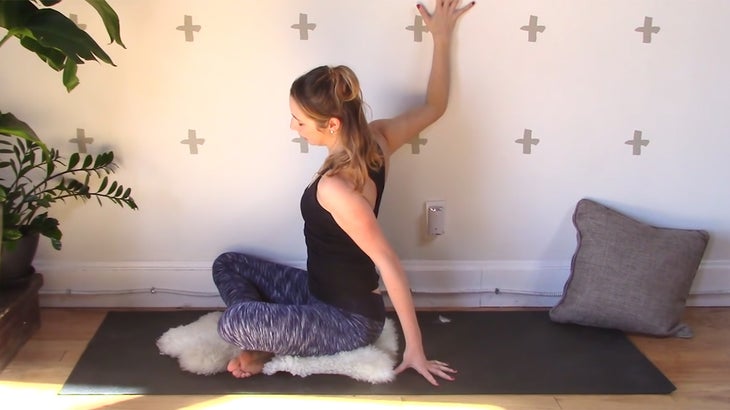
Broken Wing at the Wall
Begin sitting with your right shoulder several inches from the wall. Reach your right arm back with your palm flat against the wall. Then see how close to the wall you can shift your right hip. The closer you go, the more intense the stretch. You’re going to bend your right elbow at about a 90-degree angle and crawl your elbow a little higher than your shoulder so it’s about the same height as your gaze. Spread your fingers wide. Already from doing this you should start to feel an opening in your right shoulder and chest muscles. Bring your left fingertips to the mat behind you and press down as you try to turn your chest as if you’re looking over to the left. You won’t be able to spin too far. Relax your gaze and maybe even lean your left ear toward the left shoulder to intensify the stretch. Adjust yourself as needed so the pose is comfortable.
As you settle into the pose, imagine sending your breath to your right shoulder to create a little more space. Really the most important thing as you hold these poses is to keep breathing and relax. Whatever doesn’t need to be working right now, invite those areas of your body to let go. If your neck has started tensing up again, invite it to release. This is a terrific pose to do if you sit at a desk all day as it stretches the chest and shoulders.
When you’re ready, slowly lift your chin back in line with your chest and slide your right hand down the wall. Rest your hands on your knees and observe the difference from one side to the other. Then turn your left hip so it’s alongside the wall and repeat on this side.
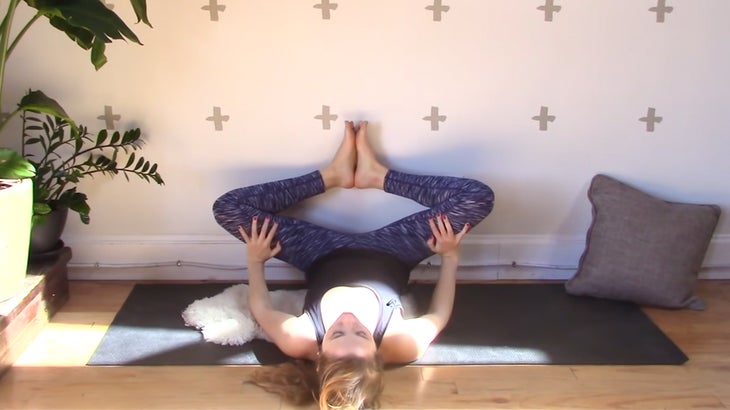
Reclined Butterfly Pose
Keep your left hip close to the wall, and then slowly lower yourself onto your back and bring your legs up the wall. Start to bend your knees and bring your feet toward one another in a restorative version of Butterfly or Bound Angle Pose. You’ll probably notice that your knees may start to draw closer toward your chest. Use your palms to lightly press your thighs toward the wall. Play around with it until you can find that comfortable shape that you can maintain. There’s not too much effort or strength required here.
As you stay in the pose, let your upper body be heavy. Although your arms are slightly engaged, you’re only using the upper body for stability and not resistance. You still want to feel your shoulders drop away from your ears, your forehead to smooth, and your jaw to be slack. Earlier you were focusing your breath in the upper back and shoulder. Here you’re breathing into the low belly, low back, and hips.
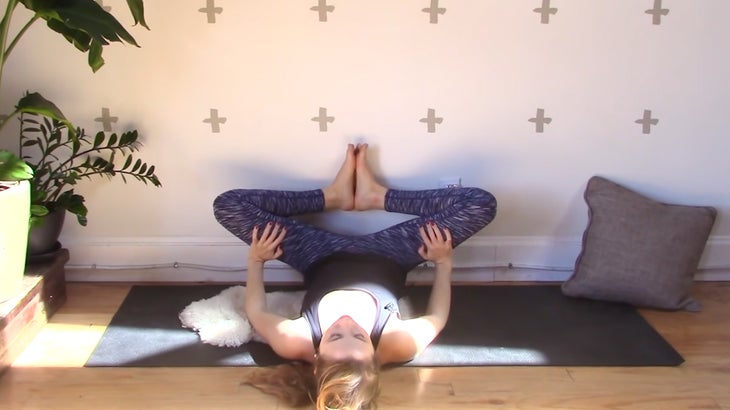
If your heels start to slide a little lower toward your hips, that’s fine. The shape of this pose will look different from person to person. Slide your hands further toward your knees and bring them toward one another, pulling them toward you and giving them a squeeze.
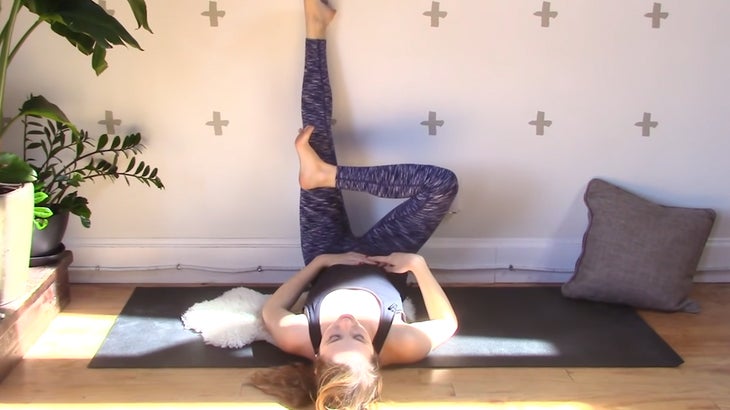
Reclined Pigeon Pose
Lift your legs so they’re straight up the wall and then bend your right knee and cross your ankle over your left thigh, keeping your right foot flexed and pressing your right knee away from you.
As you set yourself up for Reclined Pigeon Pose, you might find that you need to slide your hips further away from or closer to the wall. The closer your hips to the wall, the more intense the stretch. It can be nice to sway a little from side to side, rocking your knee back and forth, until you find your true center where your weight is evenly distributed along your low back.
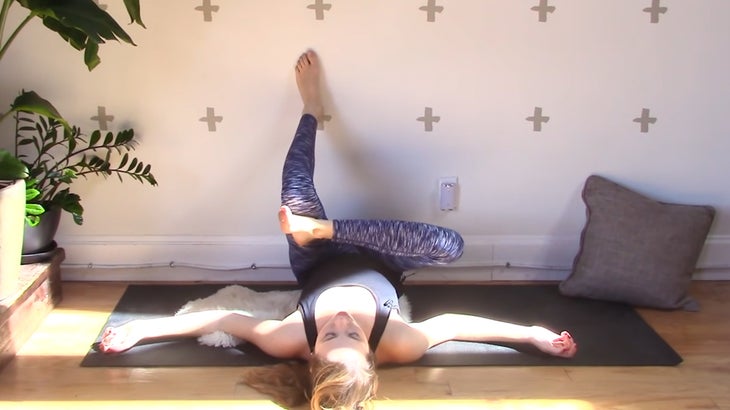
Keep your left leg straight or bend it and press your left foot into the wall and play with how high or low you place your heel against the wall. The lower your left foot, the more intense the stretch.
There’s very, very little effort required on your part. By using the wall, you avoid engaging your arms to draw your left thigh toward you as you would if it were the usual Reclined Pigeon or Figure-4 Pose. So you can allow your arms to relax.
To come out of this pose, straighten your left leg really slowly and then uncross your right foot and extend it straight up the wall. Then set yourself up for the other side and come into stillness
If you notice your mind start to wander, focus more on your breath or on the physical sensations in your body. Then slowly come out of the pose and straighten your legs.
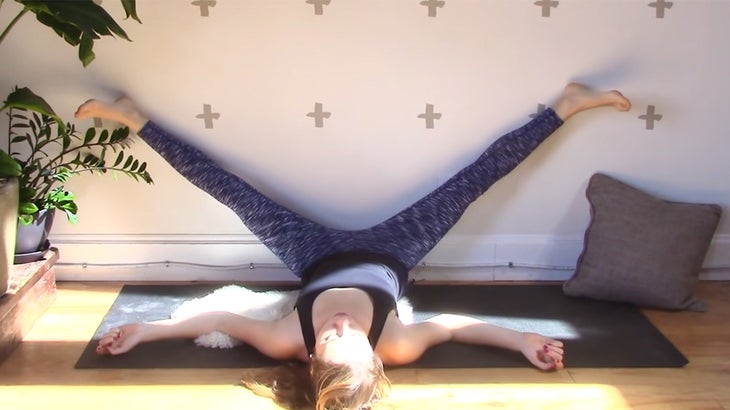
Straddle at the Wall
Let your legs slide away from one another as far as is comfortable. If you were further away from the wall in the previous pose, you might need to scooch your hips a little closer toward it. This is my favorite way of doing Straddle. Here, gravity is doing 100 percent of the work as opposed to when you practice it seated in a Wide-Legged Forward Bend. There’s absolutely no effort required on your end in this version.
Feel free to keep a soft bend in the knees and decide how deep you want to go in this pose. Allow your upper body to be heavy. Your legs can slowly open a little more with every breath you take and then stay here a little while.
As you come out of the pose, you might want to bring your hands close to your knees and help them bend a little as you lift your legs back up and pull them toward your chest, giving them a squeeze.
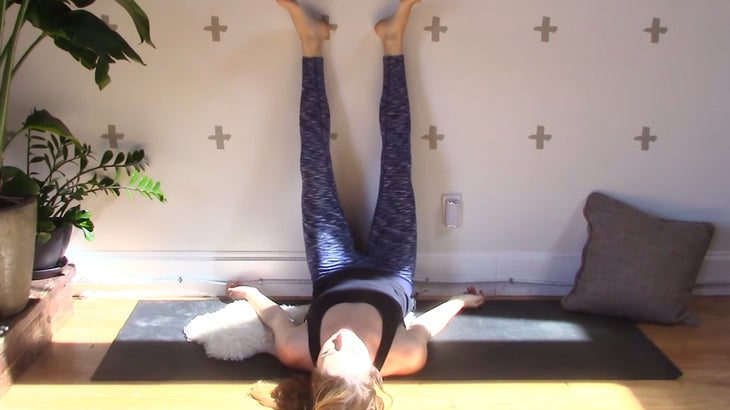
Legs Up the Wall
You can finish your yin yoga at the wall practice in Savasana by lying on the floor, if you prefer. Or you can close your practice in Legs Up the Wal.l Adjust your hips closer or farther away from the wall as needed. Keep a little bend in your knees and let your heels rest about hip-distance apart. Your upper body stays grounded. With this type of final pose, you could linger in it for upward of 10 minutes if you want. It’s a restorative pose that brings some relief to your back and lower body, especially if you’ve been standing on your feet for a long time. This is where I will leave you. Thank you so much for doing this practice with me.


